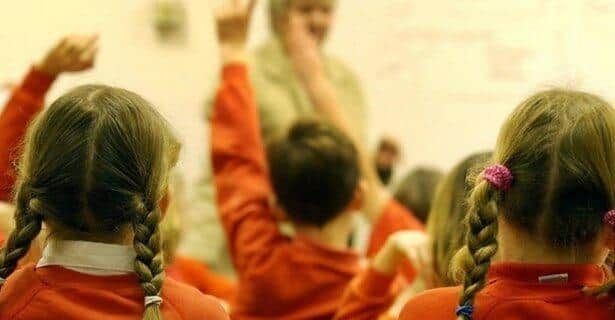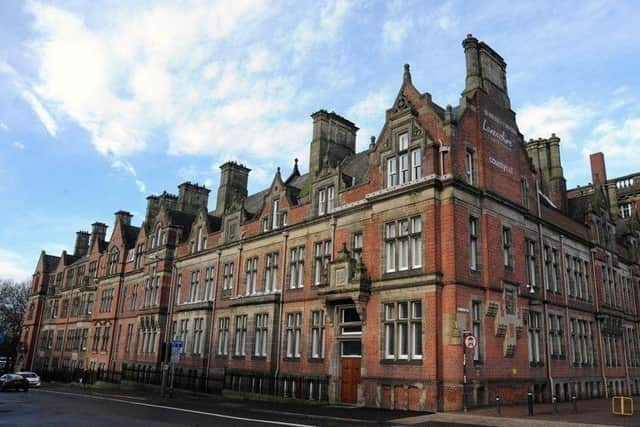Concern about class sizes over 30 in Lancashire schools amid '£28m spending power cut' claim
and live on Freeview channel 276
Ian Watkinson, the National Education Union’s (NEU) Lancashire representative - and its Preston branch secretary - says the issue is one of several that headteachers will be powerless to tackle as a result of a fall in their so-called “spending power” in the year ahead.
Government statistics show more than 15,000 Lancashire primary school children and over 10,500 secondary school pupils were taught in class sizes of 31 or more last year.
Advertisement
Hide AdAdvertisement
Hide AdData from the NEU’s School Cuts campaign suggests that schools in the Lancashire County Council area - which excludes Blackpool and Blackburn with Darwen - will experience an effective £27.8m reduction in their budgets during 2024/25 compared to the current financial year.


The government says that school funding nationwide is increasing by £1.8bn over that period, taking it to a record level per pupil in real terms, while County Hall has confirmed that its schools grant for the coming year will be £118m higher than the last.
However, the NEU calculation, which factors in staff pay rises and other inflationary costs, indicates that 438 out of 480 Lancashire primary schools will see a spending power reduction averaging £143 per pupil in real terms.
The union claims all of the county’s secondary schools will be affected by a fall in their financial firepower, which will amount to a £224 per-pupil real terms cut.
Advertisement
Hide AdAdvertisement
Hide AdIan Watkinson says that the figures will leave school facing challenges on multiple fronts - not least how many children are being taught by individual teachers.


“Persistent underfunding has led to deep and lasting effects on the entire education sector and Lancashire is no exception.
“Class sizes are at record levels - primary class sizes are the highest in Europe and secondary class sizes are the highest since records began more than 40 years ago.
“All children deserve to be taught in classes of fewer than 30, led by a qualified teacher - but this is simply not being addressed or [made] acceptable.
Advertisement
Hide AdAdvertisement
Hide Ad“The recruitment and retention crisis [means] the government cannot even meet its own targets in teacher training. It’s no wonder that teachers are continuing to leave the profession in record high numbers,” Mr Watkinson added.


According to Department for Education (DfE) data for the 2022/23 academic year, 470 Lancashire primary school classes had a rollcall of more than 30 pupils, which is 14 percent of the total number of classes in the primary phase across the county. Forty-two of those inflated classes contained 36 children or more.
The vast majority of 30+ classes were at key stage 2 level - years 3-6 - with only 39 in the reception and year 1-2 age range.
At secondary level, there were 331 classes exceeding 30 pupils - 11 percent of the overall number. Four secondary class groups had 36 or more young people within them.
Advertisement
Hide AdAdvertisement
Hide AdJohn Potter, a Liberal Democrat member of Lancashire County Council's children, families and skills scrutiny committee - and who alighted upon the NEU spending power assessment - accused the government of having “failed children in Lancashire”.


He added “Parents in our community should not have to send their children to schools which have had their funding decimated by a Conservative government that has lost interest in providing high-quality education.
“Investing in education is investing in our future, but the government has let school buildings crumble and overseen a severe shortage of teachers. Far from preparing the next generation for the future, ministers have totally abandoned them.
“The Liberal Democrats know that investment in education boosts our children’s futures. The Treasury needs to urgently look at increasing school funding.”
Advertisement
Hide AdAdvertisement
Hide AdCounty Hall’s Labour shadow member for education and skills, Mark Clifford, branded the NEU’s figures “an absolute scandal and a disgrace”.
“With eight education secretaries in six years, the Tories have neither had leadership nor direction. In Lancashire, the County Labour Group are demanding a general election now.
“Residents of Lancashire have had enough of the Tories failing our children and only Labour has a plan for our schools - a plan for high and rising standards for every child, because…our children deserve better,” County Cllr Clifford said.


Meanwhile, a spokesperson for Conservative-run Lancashire County Council said: "School budgets are allocated by the local authority following the funding settlement from government provided in December of each year. Proposals are agreed in consultation with Schools Forum and then cabinet finally approve the allocation.
Advertisement
Hide AdAdvertisement
Hide Ad“The approach to allocation adopted by the county council since 2018/19 is to mirror the government's National Funding Formula methodology.
"Lancashire's gross 2024/25 Dedicated Schools Grant allocation is £1,332.993m, an increase of £118.752m compared to the previous year.
"We know that schools are still under significant pressures related to the cost of living and demand for specialist support and we will continue to work with our schools during these challenging times."
‘SCHOOL SPENDING HAS NEVER BEEN HIGHER’
Responding to the NEU’s School Cuts data, the government told the Local Democracy Reporting Service (LDRS) that real-terms spending per pupil was heading for an all-time high in 2024/25.
Advertisement
Hide AdAdvertisement
Hide AdThe DfE says it provided an additional £525m in the current financial year to support schools with the teachers’ pay award - and will hand over a further £900m for that purpose in 2024-25. The government claimed teaching unions had confirmed these cash injections would ensure pay increases were properly funded.
A DfE spokesperson added: “School funding will be 5.5 percent higher in real terms per pupil in 2024-25 compared to 2010, when using the statistic based on independent Office for National Statistics and Office for Budget Responsibility data, which is the routine measure of public spending.
“This year alone, funding is over £3.9 billion higher and next year will increase by a further £1.8 billion, taking it to £59.6 billion, the highest ever level in real terms per pupil.”
The government says that the additional cash to cover the teachers’ pay award means funding for mainstream schools and high needs pupils was over £3.9 billion higher in 2023-24 compared to 2022-23 and, taking into account other increases, has risen by 16 percent in just two years.
Advertisement
Hide AdAdvertisement
Hide AdIt says that the gold-standard tool for comparing public sector funding and spending over time is the “GDP deflator”, which is published by the Office for National Statistics.
The NEU says it has used that measure in its calculation of non-staff cost increases for schools. Overall, the union claims that schools’ core costs per pupil rose by 6.5 percent in 2023/24 and will increase by a further 5.8 percent in 2024/25.
ADD AND SUBTRACT, BUT AS A MATTER OF FACT…
The Dedicated Schools Grant is a ringfenced cash pot allocated to every local education authority each year and is made up of four “funding blocks”, calculated using national formulae.
The Schools Block funds mainstream primary and secondary schools and academies and will increase by 1.9 percent nationwide in 2024/25.
Advertisement
Hide AdAdvertisement
Hide AdLancashire County Council’s Schools Block allocation in the coming year has been set at £978m - just over £51m more than in 2023/24. The increase comes from the county’s share of additional government funding and as a result of a slight increase in the number of pupils in Lancashire primary and secondary schools, as revealed in the October 2023 school census.
Nevertheless, the authority says it faces “pressures” within the Schools Block, meaning it has had to take £1.2m from its Dedicated Schools Grant reserves in order to set the budget for the year ahead.
County Hall has also set the local level of the government’s minimum funding guarantee - designed to protect schools from significant fluctuations in per-pupil funding from one year to the next - at +0.5 percent for 2024/25.
Meanwhile, the High Needs Block for special schools and academies in the county council area will increase by £8.75m in the next financial year, to stand at just over £201m, purely as result of increased government funding.
Advertisement
Hide AdAdvertisement
Hide AdThe other two elements of the Dedicated Schools Grant relate to early years, or pre-school, provision, as well as a pot for services provided centrally by local authorities on behalf of pupils in state-funded maintained schools and academies in England.